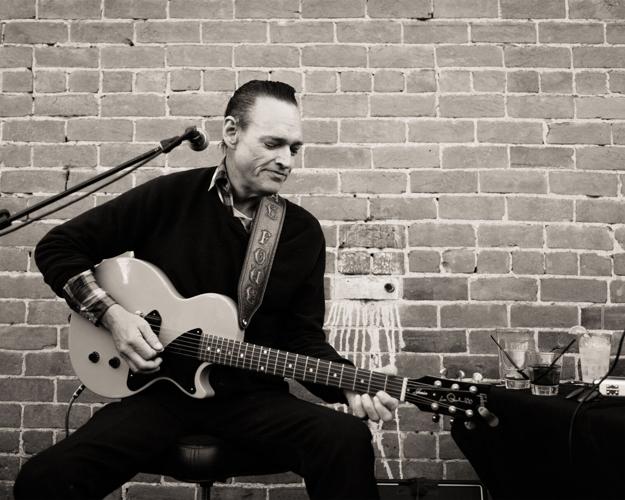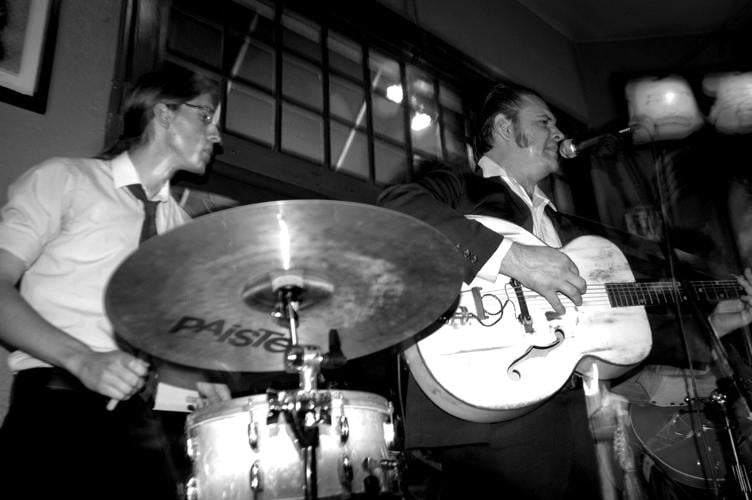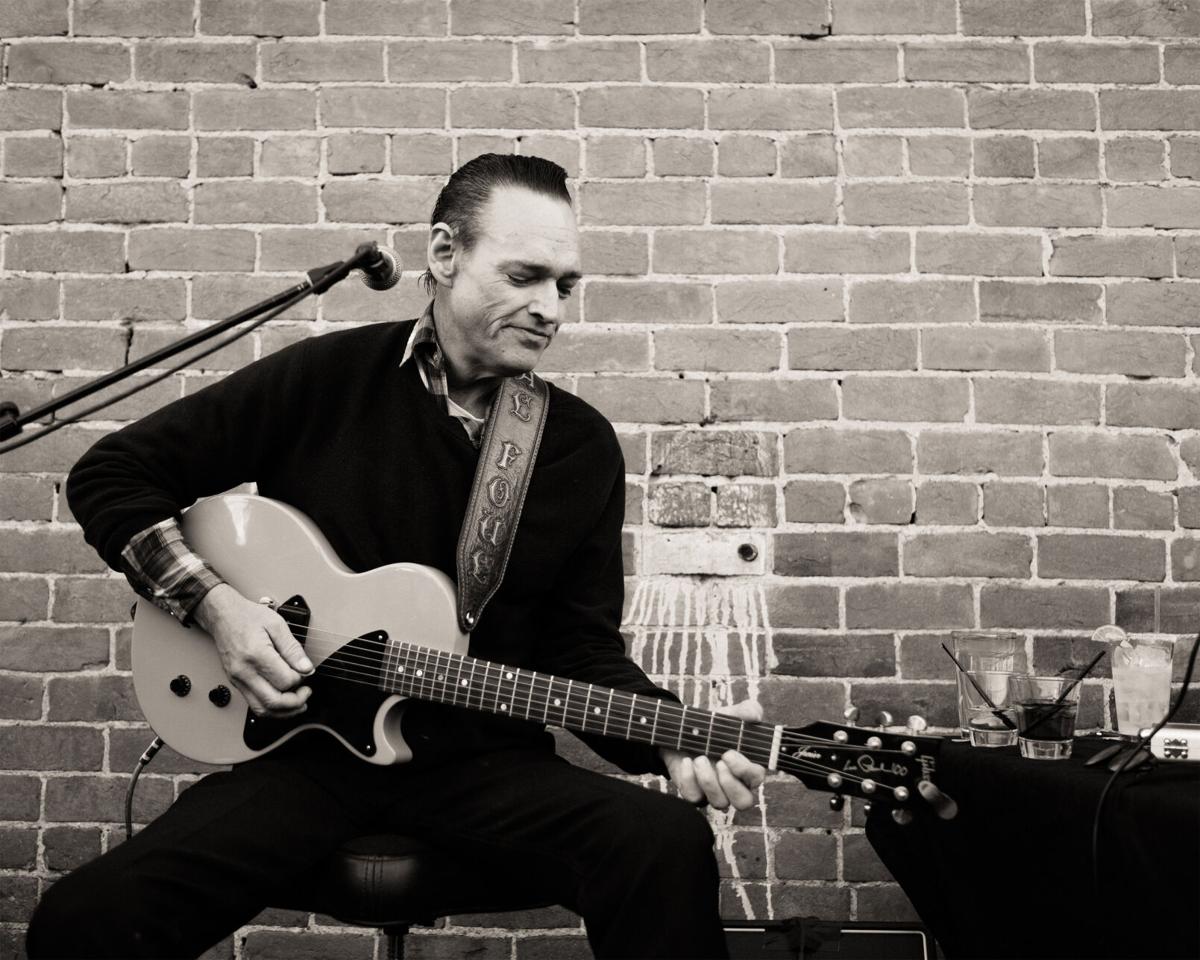Al Foul had this imposing stature, burly almost like a lumberjack, with slicked back hair circa 1950s blue-collar hipster and piercing eyes that at first glance could intimidate.
But get him on stage, strumming his guitar and working the bass drum with his right foot, a makeshift percussion box and tambourine with his left, and the true character of the man came through.
“I think the reason everybody loved him was that he was a really good person,” Tucson guitarist Ben Nisbet said Thursday as news of Foul’s death on Wednesday, May 25, began circulating on social media and among the tight-knit Tucson music community. “He was the person who had an incredibly strong sense of integrity and a remarkable moral compass.”
“He looks like this tough guy, but Al was someone who was very profound and ... able to take the best out of life,” added Naim Amor, who also played guitar in Foul’s band for a number of years and had been friends with him for nearly 20. “Definitely not someone who would cry over himself, but someone who was very sensitive and very compassionate.”
Foul had been battling throat cancer for 18 months and died late Wednesday night at home with his wife, KXCI radio personality Hannah Levin, by his side. He was 50 years old.
Foul — born Alan Lewis Curtis — took his name from his time with Boston’s short-lived drunk rock punk band the Foul Mouthed Elves. He was in his late teens when he moved to Arizona from his native Boston, first to Phoenix and then to Tucson.
He started performing in Tucson in the early 1990s with his band Al Foul & the Shakes and solo as a one-man band, singing rockabilly-influenced original songs that beckoned the birth of American rock.
“He was such a unique entity in town. He was one of the very few who channeled that incredible old school rock ‘n roll sound,” said Hotel Congress music booker David Slutes, who was fronting the popular Sidewinders/Sand Rubies band around the time Foul was starting his Tucson music career. “No one did what Al Foul did. Some people did rockabilly and roots rock, but his energy and commitment was unlike any one else.”
His music was rooted in rockabilly and punk with flashes of country and Americana that he performed at a number of Tucson venues including the old Vaudeville on East Congress Street to Che’s Lounge on North Fourth Avenue.
“Musically, he was fearless,” said bluesman Tom Walbank, who met Foul not long after Walbank moved to Tucson in 2001. “You could describe him as country or rock and roll, but he was just Al. He had arrived at his own genre, very much in his way as you would describe Johnny Cash.”
“He was an incredible musician and one of the most naturally gifted musicians I have worked with in any setting of any kind,” added Nisbet, a multi-instrumentalist and classically trained violinist who played for years with the Tucson Symphony Orchestra.
Levin said her husband of a year was “a lot different than some of the bravado that defined his stage presence.”
“He strongly disliked a lot of trappings of modern masculinity and rock ’n’ roll cliches,”recalled Levin, who met Foul at a Thanksgiving eve party in 2015 where she was the DJ and he was performing. “He disliked professional sports, gambling, strip bars and hard drugs but loved cooking, woodworking and painting.”
Levin said Foul started painting when he was diagnosed with cancer and had gotten very good at it.
“People loved his paintings,” she said.
Walbank described Foul as “larger than life,” which was what French musician and DJ Laurent Allinger said attracted him to Foul when they first met in 1997. Allinger and his band the Little Rabbits were recording at Jim Waters’ Waterworks studio and would see Foul hanging out at 7 Black Cats, The Grill, Che’s Lounge and other downtown Tucson bars.

Al Foul of Al Foul & the Shakes at the mic at Che's Lounge in 2006.
“Al was playing and I was immediately captivated by his attitude and the sincerity of his singing, even though I didn’t understand the words,” Allinger said in an email interview. “I don’t remember if he was in a one-man band format or with his band The Shakes. His music had a variety of influences from traditional music to punk rock with his wild way of playing. ... I immediately sensed in him an open mind and something fascinating. A unique character not trying to imitate anyone.”
Allinger and Foul became fast friends and Foul came to Allinger’s hometown of Nantes, France, a number of times over the past 20 years including in 2005 with several other Tucson bands for the “We Got Cactus Tour” that included stops in several French cities. He and Allinger also performed as a duo — Al Foul & French Tourist — with Allinger working the turntable while Foul sang.
Allinger was with Foul at his final performance last December at Che’s Lounge.
Levin said Foul was in a great deal of pain that night, “but it was important for him to do it, especially because Laurent Allinger was there and he knew it would be their last show together.”
In a Facebook post on March 5, 2021 — the day that a tribute album by 28 local musicians covering Foul’s songs was released to help defray Foul’s medical bills — Foul mused about his time in Nantes and about his music and his adopted hometown of Tucson.
“I am fortunate to have had a long and complicated relationship with music. It’s who I am and all I ever wanted to be,” he wrote. “Tucson gave me the opportunity as young man to be whomever I wished to be. There was no pressure or scene pushing or pulling in any direction, just a bunch of folks doing their own thing. I was lucky to find this place.”
Amore said Foul understood Tucson from the moment he unpacked his guitar back in the 1990s.
“If you came to Tucson in the 1990s or even now, you didn’t come here for fame. You came here to live it fully instead of trying to make it big,” Amore said. “Al came here to embrace what Tucson is.”
Walbank said the loss of Foul is “immeasurable.”
“He was part of the fabric,” Walbank said. “If there’s an elaborate quilt and it’s made out of all of us, there’s a piece missing. He made his mark, though. He will never be forgotten.”






